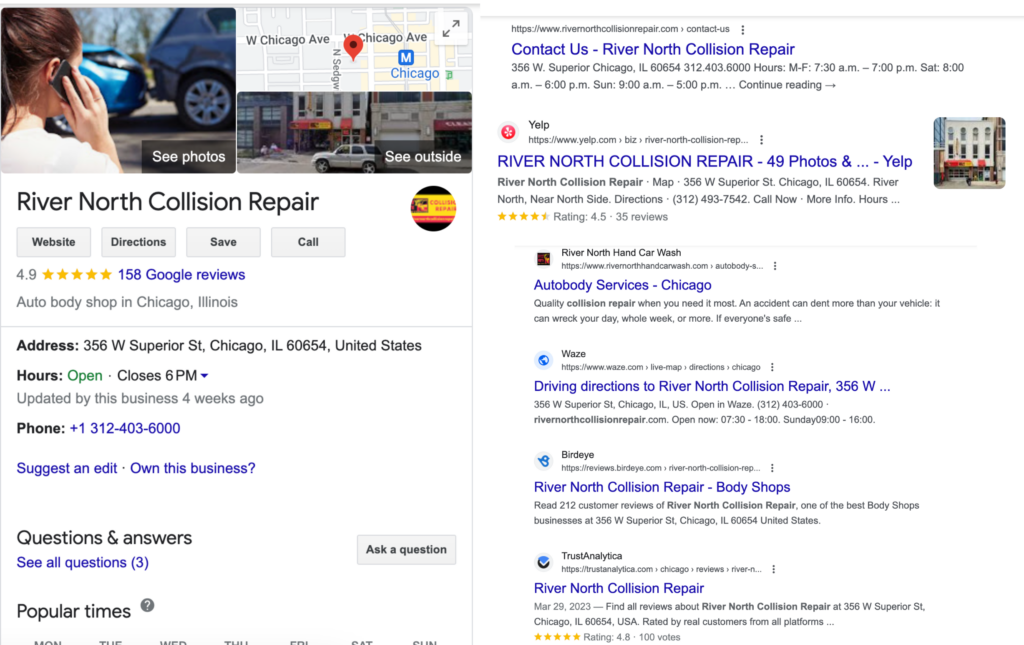Having a strong online presence is essential for the success of any business. When it comes to local businesses, leveraging local search engine optimization (SEO) strategies is a game-changer.
In this comprehensive guide, we'll discuss “local SEO for my business,” exploring its benefits, implementation strategies, and how it can significantly impact your business growth. By the end of this article, you'll have a clear roadmap to optimize your website for local SEO success.
What Is Local SEO?
Local SEO, or local search engine optimization, is a digital marketing strategy aimed at enhancing a business's visibility in local search results. It involves optimizing various aspects of your online presence to ensure your business appears prominently when users search for products or services in their local area.
Local business SEO focuses on driving targeted traffic to your website, improving your business's online reputation, and increasing foot traffic to your physical location.
What is local search optimization? In our blog, we can explain the importance of small business search engine optimization. Your local SEO analysis plays a big part in that.
Benefits of Implementing Local SEO Strategies
Implementing local SEO strategies offers numerous benefits that can directly impact your business's bottom line. Some of these benefits include:
1. Enhanced Online Visibility
Local search SEO increases your chances of being found by potential customers in your area, putting your business at the forefront of their search results.
2. Higher Quality Leads
Local searches often indicate high purchase intent. Optimizing for local SEO allows you to target users actively seeking your products or services.
3. Improved Conversion Rates
When users find your business in local search results, they are more likely to convert into paying customers, especially if they're looking for a nearby solution.
4. Better User Experience
Local SEO optimization often includes providing accurate and up-to-date information about your business, such as contact details, working hours, and reviews, which enhances user experience. This is a huge reason why local SEO is important.
5. Competitive Edge
By optimizing for local SEO, you gain an edge over competitors who may not have fully embraced these strategies. Local search management is part of using all the available tools to stay ahead of others in the industry.
Continue reading about local SEO management to convert the increased traffic from your local SEO business into actual sales.
11 Ways How to Optimize Your Website for Local SEO
Unlocking the power of local SEO is no longer just an option—it's a necessity for businesses aiming to thrive. Whether you're a local entrepreneur or a seasoned marketer, these techniques are your roadmap to boosting your online presence and driving more foot traffic to your business.
1. Optimize for Google My Business
Google My Business (GMB) is a cornerstone of Google local SEO. Your GMB listing provides essential information about your business, including its name, address, phone number (NAP), and customer reviews. To optimize your GMB listing:
- Claim and verify your listing.
- Provide accurate business information, including categories and attributes.
- Add high-quality photos showcasing your products, services, and premises.
- Regularly respond to reviews and engage with customers.
- Utilize GMB features like posts and Q&A to keep users informed.
Remember, GMB optimization directly impacts your local search rankings and online reputation. Do not sleep on these local SEO tips if you want success with Google search engines.
2. Develop Tailored Localized Content
Creating locally-focused content is a powerful local SEO strategy. Start by conducting local keyword research to identify terms relevant to your business and location. Generate content ideas such as blog posts, articles, and guides that cater to the needs and interests of your local audience.
For more on the importance of content, check out our article, Content Is King. We can also help you market your articles for maximum visibility. Then you know your top-quality content will not go unnoticed.
3. Optimize URL, Title Tags, Headers, Meta Description, and Content for Local Relevance
Optimizing your website's key elements for local relevance is crucial. Incorporate local keywords in your URLs, title tags, headers, and meta descriptions to increase your chances of appearing in local search results.
Crafting compelling meta descriptions can boost your click-through rates, driving more traffic to your website. To master the art of writing SEO titles, our guide is a must-read.
4. Leverage Social Media Engagement and Utilize Google My Business Posts
Social media engagement plays a vital role in local SEO. Regularly engage with your audience on platforms like Facebook, Instagram, and Twitter.
In addition, use Google My Business posts to showcase promotions, events, and updates, enhancing your local online presence. Discover the synergy between social media and content marketing. Social media garners such high traffic, so find ways to show up on someone’s feed a few times throughout the week to keep your brand at the forefront of their minds.
5. Ensure Your NAP (Name, Address, Phone Number) Are Accurate

Consistency is key when it comes to your NAP information. Inconsistent NAP details across directories can negatively impact your local rankings. Regularly check and correct NAP information on different platforms, ensuring uniformity and accuracy.
Use tools to check for NAP consistency across all platforms, such as Bright Local. The last thing you want is someone contacting you to share that your NAP information is incorrect online.
6. Enhance Online Directories and Citations for Better Visibility
Online directories and citations play a crucial role in local SEO. These platforms provide valuable information about your business and contribute to its online reputation. Here's how you can optimize this aspect of local SEO:
Begin by identifying authoritative online directories that are relevant to your industry and location. Some popular options include Yelp, Yellow Pages, and Angi.
Claim and optimize your business listings on these directories, ensuring that your NAP information is consistent across all platforms. Consistency helps search engines verify your business's credibility and boost local rankings.
When optimizing directory listings, provide comprehensive and accurate information about your business. This includes your business description, working hours, services offered, and images showcasing your products or premises. The more complete and informative your listings are, the more likely users are to engage with your business.
While you aim to optimize well-known directories, also consider niche-specific directories related to your industry. These directories can provide targeted exposure to your local audience.
To acquire high-quality citations, focus on reputable sources. Quality matters more than quantity in this context. Seek opportunities to be featured on local websites, news articles, and blogs. Each citation from a credible source adds to your business's authority in the eyes of search engines, positively impacting your local SEO efforts.
7. Integrate Location-Specific Pages into Your Website
Location-specific pages are a powerful tool for local SEO. These pages are dedicated to specific geographic areas you serve. They offer information tailored to local customers and enhance your visibility in relevant local searches.
When creating location-specific pages, consider the following:
- Content: Craft unique content that highlights your business's offerings, specialties, and relevance in that particular location.
- NAP: Include your business's accurate Name, Address, and Phone Number (NAP) on each location page.
- Maps: Embed interactive maps that guide visitors to your physical location or service areas.
- Customer Reviews: Showcase customer testimonials and reviews specific to that location, adding credibility and trust.
Remember that these pages are an opportunity to demonstrate your commitment to the local community and provide valuable information to potential customers.
8. Enhance Internal Linking Structure for Improved Local SEO
An optimized internal linking structure contributes to both user experience and search engine visibility. Here's how to enhance it for local SEO:
- Link Relevance: Link relevant local content across your website's pages. For instance, if you have a blog post about "Best Restaurants in [Your City]," link it from your homepage or service pages.
- Anchor Text: Optimize anchor text with local keywords. Instead of using generic terms like "click here," use descriptive phrases that include your location and relevant keywords.
- Sitemap and Navigation: Ensure that your website's sitemap and navigation are user-friendly and logical, making it easy for visitors to find location-specific information.
Well-structured internal links improve user navigation and help search engines understand the hierarchy and importance of your content.
9. Obtain Quality Inbound Links with Relevance and Credibility
Inbound links, also known as backlinks, are essential for local SEO success. Quality inbound links from authoritative local websites signal to search engines that your business is a trusted source of information. Here's how to obtain them:
- Identify Local Authorities: Look for local websites, blogs, news outlets, and industry associations that are relevant to your business.
- Guest Blogging: Offer to write guest posts for local websites. In return, you can include links back to relevant pages on your website.
- Collaborate with Local Influencers: Partner with local influencers, bloggers, or businesses for co-promotion. These partnerships can lead to valuable backlinks.
- Sponsorships and Events: Participate in or sponsor local events, and ensure that your business is mentioned on event websites or related articles.
Quality matters more than quantity when it comes to inbound links. Relevance and credibility should be your primary considerations.
10. Ensure Mobile Responsiveness of Your Website
Mobile optimization is no longer optional; it's a necessity for local SEO. With the rise in mobile searches, search engines prioritize mobile-friendly websites. Here's how to ensure your website is mobile-responsive:
- Test Your Website: Use Google's Mobile-Friendly Test tool to evaluate your website's mobile responsiveness.
- Responsive Design: Opt for a responsive website design that adjusts seamlessly to various screen sizes and devices.
- Fast Loading Times: Ensure your website loads quickly on mobile devices. Slow-loading websites can deter users and negatively impact your search rankings.
- Mobile Usability: Check that all interactive elements, such as buttons and links, are easy to tap and use on mobile screens.
Mobile optimization not only improves your local SEO but also enhances user experience for visitors accessing your website from smartphones and tablets.
11. Optimize Frequently Asked Questions
Answering common questions related to local SEO can provide valuable insights for readers. Consider addressing questions like "What is local SEO?" "Why is local SEO important for small businesses?" and "How can I implement local SEO strategies?"
No matter your subject matter, offering clear and concise answers to these questions can further engage your audience and provide them with actionable information.
Get into the Local SEO Business
Optimizing your website for local SEO is a strategic investment that can yield substantial rewards for your business. Following the strategies outlined in this guide can enhance your online visibility, attract high-quality leads, and establish your business as a reputable local authority.
Ready to supercharge your local online presence and attract more local customers? Let's put these proven local SEO strategies into action with Loupe & Blade. Boost your visibility, engage your community, and watch your business thrive. Contact us today to elevate your website's local SEO game and take your business to the next level!

No Comments.